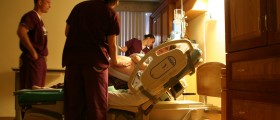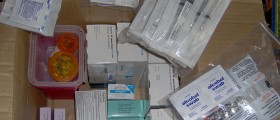
Down Syndrome is a Birth Defect
Down syndrome is a genetic defect that affects 1 in 8 live births and is the most prevalent such anomaly in the United States. The condition was first described by a physician named John Langdon Down who identified the syndrome but did not understand its genetic cause. Not until the late 1950s were the genes responsible for Down syndrome identified. Over 50 percent of individuals born with Down syndrome live more than 50 years on average, which is a substantial increase achieved by improved medical care and overall acceptance and understanding by the general public.Cell Division Causes Down Syndrome
The genetic cause of Down syndrome has been clear for quite some time. There are three distinct types of abnormal cell division in the chromosome 21 which are responsible for the development of the condition. The first type is the trisomy 21, the most common kind of Down syndrome, which affects more than 90 percent of all the cases. An entire extra chromosome 21 is inherited from either the mother or the father at conception. As a result there are three copies of chromosome 21 instead of two. In the case of the trisomy 21 Down syndrome, the extra chromosome is present in every cell. The mosaic trisomy 21 is the type of Down syndrome which is characterized by the inheritance of some genes from the additional chromosome 21 instead of the whole chromosome. In other words, the additional genes are present in some but not all the cells in the body. Similarly, the mosaic trisomy 21 is the milder type of the disorder with only some of the symptoms present. Lastly, the translocation trisomy 21 is the kind of Down syndrome in which the additional chromosome 21 is attached to another chromosome, usually chromosome 14. If a couple has one child with translocation trisomy 21 Down syndrome there is an increased possibility that the condition will be present in future offspring. Inheritance of the translocation depends on the sex of the carrier. Mainly, if the carrier is the mother there is a 12 percent change of passing the translocation whereas if the carrier is the father there is 3 percent chance. Genetic counseling is provided for parents who may be carriers of translocation. Other than the genetic causes there are no other known factors contributing to Down syndrome.Risk Factors for Down Syndrome
When it comes to the risk factors for Down syndrome one of the most potent ones is the age of the mother. The older the mother is the higher the chance of having a child with Down syndrome. For instance, if the mother is 20 years old there is a 1 in 1,600 chance, but if she is 40 the possibility increases to 1 in 90. Another important element to consider is whether a couple already has a child with Down syndrome as with each subsequent offspring the possibility for the disorder slightly increases. Also, parents who are carriers of the defected genes are likely to have a child with Down syndrome so genetic screening in important for all couples who are considering having children. In addition, individuals affected by Down syndrome rarely have children. Only about 15 to 30 percent of women with Down syndrome are capable of reproducing and if they do there is a 50 percent chance their offspring will have the condition. So far, there hasn't been a case in which a male with Down syndrome has had a child. It should be noted that women up to 35 years old have more children than their older counterparts but at the same time 85 percent of children born with Down syndrome have mothers younger than 35 even though the risk jumps substantially after that age.Tests for Down Syndrome
There are numerous tests performed during pregnancy to screen for Down syndrome. For instance, percutaneous umbilical blood sampling is administered after 18 weeks of pregnancy and has been widely reliable. There is also the amniocentesis which is performed after 15 weeks and lastly the chorionic villus sampling is done between the 9th and 14th week of pregnancy. When it comes to the tests after the baby is born the first type of assessment is made based on the child’s appearance. If there is a possibility that the newborn may have Down syndrome the karyotype test is administered. The presence of an additional chromosome 21 is sufficient for Down syndrome to be diagnosed. In addition, there are various reasons why couples should be tested. Learning on time that the unborn child has Down syndrome gives parents the opportunity to decide whether they want to carry it to terms or prepare for a child with special needs. On the other hand, there are always parents who are comfortable with any kinds of results or who because of religious, personal or moral reasons do not wish to be tested.
















Your thoughts on this
Loading...